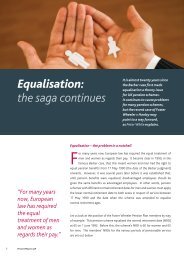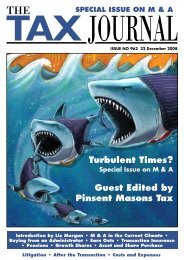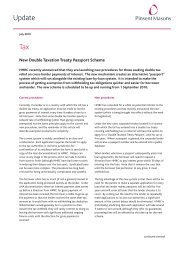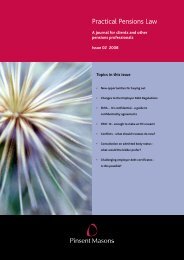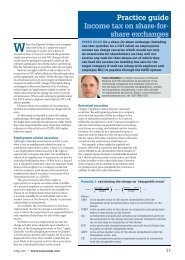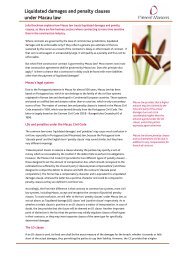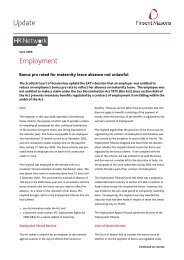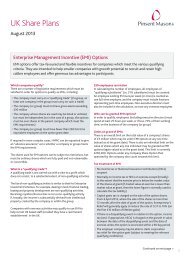EAT gives guidance on the statutory grievance ... - Pinsent Masons
EAT gives guidance on the statutory grievance ... - Pinsent Masons
EAT gives guidance on the statutory grievance ... - Pinsent Masons
Create successful ePaper yourself
Turn your PDF publications into a flip-book with our unique Google optimized e-Paper software.
Update<br />
January 2006<br />
Employment<br />
<str<strong>on</strong>g>EAT</str<strong>on</strong>g> <str<strong>on</strong>g>gives</str<strong>on</strong>g> <str<strong>on</strong>g>guidance</str<strong>on</strong>g> <strong>on</strong> <strong>the</strong> <strong>statutory</strong> <strong>grievance</strong> procedure<br />
Criticism of <strong>the</strong> <strong>statutory</strong> dismissal and <strong>grievance</strong> procedures, which were introduced in October<br />
2004, has been growing from all sides over <strong>the</strong> last few m<strong>on</strong>ths. One of <strong>the</strong> biggest problems for<br />
employers relates to <strong>the</strong> standard <strong>grievance</strong> procedure (SGP). This requires an employee to send a<br />
written <strong>grievance</strong> to <strong>the</strong> employer (known as a ‘Step 1 <strong>grievance</strong>’) before commencing most types<br />
of tribunal claim. The employer must <strong>the</strong>n invite <strong>the</strong> employee to a meeting to discuss matters -<br />
or risk paying increased compensati<strong>on</strong> if <strong>the</strong> employee subsequently brings a successful tribunal<br />
claim.<br />
It is <strong>the</strong>refore crucial that employers<br />
are able to identify Step 1 <strong>grievance</strong><br />
letters quickly and easily, yet <strong>the</strong>re is<br />
little <strong>statutory</strong> <str<strong>on</strong>g>guidance</str<strong>on</strong>g> to help <strong>the</strong>m.<br />
However, in recent weeks <strong>the</strong> <str<strong>on</strong>g>EAT</str<strong>on</strong>g> has<br />
handed down a number of decisi<strong>on</strong>s<br />
which throw some much needed light<br />
<strong>on</strong> this issue.<br />
The <str<strong>on</strong>g>EAT</str<strong>on</strong>g>'s view<br />
According to <strong>the</strong> <str<strong>on</strong>g>EAT</str<strong>on</strong>g>:<br />
• A resignati<strong>on</strong> letter setting out <strong>the</strong><br />
general nature of <strong>the</strong> employee's<br />
complaint can c<strong>on</strong>stitute a Step 1<br />
<strong>grievance</strong> under <strong>the</strong> SGP (Thorpe;<br />
Shergold; Galaxy Showers);<br />
• By c<strong>on</strong>trast a discriminati<strong>on</strong><br />
questi<strong>on</strong>naire is not a Step 1<br />
<strong>grievance</strong> (Holc-Gale);<br />
• The Step 1 letter need not be sent<br />
by <strong>the</strong> employee pers<strong>on</strong>ally to <strong>the</strong><br />
employer pers<strong>on</strong>ally - a letter<br />
before acti<strong>on</strong> sent by solicitors will<br />
suffice (Aspland);<br />
• The employee need not intend to<br />
raise <strong>the</strong> mater as a <strong>grievance</strong><br />
(Thorpe), use <strong>the</strong> word <strong>grievance</strong>,<br />
refer to <strong>the</strong> <strong>statutory</strong> procedures<br />
(Shergold) or indicate that <strong>the</strong><br />
complaint may go fur<strong>the</strong>r (Galaxy<br />
Showers). As a result employers<br />
will need to be particularly vigilant<br />
when assessing written<br />
communicati<strong>on</strong>s from employees;<br />
• The Step 1 <strong>grievance</strong> need not<br />
comply with <strong>the</strong> employer's own<br />
<strong>grievance</strong> procedure (Thorpe and<br />
Shergold). This is particularly<br />
unsatisfactory as it means <strong>the</strong> Step<br />
1 <strong>grievance</strong> need not necessarily be<br />
sent to <strong>the</strong> pers<strong>on</strong> nominated<br />
under <strong>the</strong> employer's procedure<br />
and could lead to <strong>the</strong> <strong>grievance</strong><br />
being overlooked.<br />
Practical implicati<strong>on</strong>s<br />
An employer should be wary of any<br />
written communicati<strong>on</strong> from an<br />
employee or ex-employee that could<br />
possibly be c<strong>on</strong>strued as a complaint<br />
or <strong>grievance</strong>. It is essential that all<br />
managers (and not just senior staff or<br />
HR professi<strong>on</strong>als) are trained to<br />
appreciate that such a letter could be<br />
a Step 1 <strong>grievance</strong> and that failure to<br />
invoke <strong>the</strong> remaining stages of <strong>the</strong><br />
<strong>statutory</strong> procedure could cost <strong>the</strong><br />
employer dear.<br />
Changing terms and c<strong>on</strong>diti<strong>on</strong>s: employers beware<br />
The recent case of Land Securities<br />
Trillium v Thornley is a reminder that<br />
employers must tread carefully when<br />
seeking to alter terms and c<strong>on</strong>diti<strong>on</strong>s<br />
without <strong>the</strong> employee's c<strong>on</strong>sent.<br />
Management role imposed by<br />
employer<br />
The case c<strong>on</strong>cerned an architect who<br />
resigned and claimed c<strong>on</strong>structive<br />
unfair dismissal after her employer<br />
unilaterally changed her duties by<br />
requiring her to manage external<br />
design c<strong>on</strong>sultants ra<strong>the</strong>r than having<br />
a hands-<strong>on</strong> design role herself.<br />
Normally <strong>the</strong>re is a clear breach of<br />
c<strong>on</strong>tract if an employer imposes a<br />
change of c<strong>on</strong>tractual duties without<br />
<strong>the</strong> employee's c<strong>on</strong>sent. In additi<strong>on</strong>, if<br />
<strong>the</strong> change is sufficiently serious, it will<br />
amount to a fundamental breach of<br />
c<strong>on</strong>tract entitling <strong>the</strong> employee to<br />
resign and claim unfair dismissal.<br />
However in <strong>the</strong> Thornley case <strong>the</strong><br />
employee's c<strong>on</strong>tract c<strong>on</strong>tained a<br />
flexibility clause, under which <strong>the</strong><br />
employee had to perform all <strong>the</strong> duties<br />
of her post and ‘any o<strong>the</strong>r duties’<br />
which could ‘reas<strong>on</strong>ably’ be required of<br />
her. The employer argued that this<br />
provisi<strong>on</strong> gave it a broad c<strong>on</strong>tractual<br />
right to alter Ms Thornley's duties<br />
unilaterally. Accordingly, in <strong>the</strong><br />
employer's view, <strong>the</strong> change of role<br />
could not amount to a fundamental<br />
breach of c<strong>on</strong>tract and Ms Thornley's<br />
unfair dismissal case could not get off<br />
<strong>the</strong> ground.<br />
C<strong>on</strong>tinued <strong>on</strong> reverse
<str<strong>on</strong>g>EAT</str<strong>on</strong>g> finds for employee<br />
The employment tribunal disagreed<br />
and found for <strong>the</strong> employee. Its<br />
decisi<strong>on</strong> was subsequently upheld by<br />
<strong>the</strong> <str<strong>on</strong>g>EAT</str<strong>on</strong>g> which c<strong>on</strong>firmed that <strong>the</strong><br />
flexibility clause was not wide enough<br />
to cover a change that would<br />
effectively de-skill Ms Thornley as a<br />
hands-<strong>on</strong> architect, regardless of<br />
whe<strong>the</strong>r <strong>the</strong>re was a sound<br />
commercial reas<strong>on</strong> for <strong>the</strong> change.<br />
There had <strong>the</strong>refore been a<br />
fundamental breach of c<strong>on</strong>tract<br />
entitling <strong>the</strong> employee to resign and<br />
claim c<strong>on</strong>structive dismissal.<br />
Practical implicati<strong>on</strong>s<br />
Employment c<strong>on</strong>tracts often c<strong>on</strong>tain<br />
clauses which purport to give <strong>the</strong><br />
employer some degree of flexibility,<br />
particularly in respect of changes to<br />
duties, working hours and job locati<strong>on</strong>.<br />
However as <strong>the</strong> Thornley case shows,<br />
courts tend to c<strong>on</strong>strue such clauses<br />
very narrowly and it can be difficult to<br />
know <strong>on</strong> which side of <strong>the</strong> line a<br />
particular case falls. One alternative to<br />
imposing a change unilaterally is to<br />
terminate <strong>the</strong> old c<strong>on</strong>tract and offer<br />
<strong>the</strong> employee new terms and<br />
c<strong>on</strong>diti<strong>on</strong>s, but this course of acti<strong>on</strong><br />
has its own risks and needs to be<br />
c<strong>on</strong>sidered in light of all <strong>the</strong><br />
circumstances. Taking professi<strong>on</strong>al<br />
advice in this type of case is <strong>the</strong>refore<br />
str<strong>on</strong>gly recommended.<br />
Do You Need To Know…?<br />
Age discriminati<strong>on</strong>: an update<br />
Legislati<strong>on</strong> to outlaw age discriminati<strong>on</strong> in <strong>the</strong> workplace is<br />
due to take effect <strong>on</strong> 1 October 2006. The new law will<br />
have a significant impact <strong>on</strong> a range of issues, including<br />
recruitment, age-related benefits and retirement.<br />
The Government originally promised to finalise <strong>the</strong><br />
legislati<strong>on</strong> by <strong>the</strong> end of 2004, <strong>the</strong>reby giving employers<br />
some two years to prepare for this fundamental change in<br />
working practices. However, this has proved to be a<br />
hopelessly optimistic timetable and, in <strong>the</strong> event, draft<br />
Regulati<strong>on</strong>s were <strong>on</strong>ly made available for c<strong>on</strong>sultati<strong>on</strong> in<br />
July 2005. Since <strong>the</strong>n <strong>the</strong> Government's proposals have<br />
been widely criticised by employers, and as a result <strong>the</strong><br />
final Regulati<strong>on</strong>s may well c<strong>on</strong>tain important amendments.<br />
N<strong>on</strong>e<strong>the</strong>less <strong>the</strong> DTI is currently indicating that it will be<br />
‘towards <strong>the</strong> end of February’ before <strong>the</strong>se are publicly<br />
available. This will give employers very little time to assess<br />
<strong>the</strong> impact of <strong>the</strong> Regulati<strong>on</strong>s before <strong>the</strong>y become law. We<br />
will keep you abreast of developments.<br />
Limits <strong>on</strong> tribunal compensati<strong>on</strong> to rise<br />
The <strong>statutory</strong> limits <strong>on</strong> <strong>the</strong> compensati<strong>on</strong> that can be<br />
awarded for certain tribunal claims are set to increase in<br />
line with inflati<strong>on</strong>. In particular, <strong>the</strong> maximum amount of a<br />
week's pay (used for calculating redundancy payments and<br />
<strong>the</strong> unfair dismissal basic award) increases from £280 to<br />
£290. The maximum compensatory award for unfair<br />
dismissal also goes up from £56,800 to £58,400.<br />
The increases apply where <strong>the</strong> effective date of terminati<strong>on</strong><br />
(or o<strong>the</strong>r relevant event) occurs <strong>on</strong> or after 1 February<br />
2006.<br />
TUPE Regulati<strong>on</strong>s due any day<br />
Shortly before Christmas <strong>the</strong> DTI announced it intended to<br />
lay <strong>the</strong> l<strong>on</strong>g awaited TUPE Regulati<strong>on</strong>s before Parliament in<br />
January 2006. The finalised regulati<strong>on</strong>s will c<strong>on</strong>tain changes<br />
made following last year's c<strong>on</strong>sultati<strong>on</strong> exercise. It remains<br />
<strong>the</strong> intenti<strong>on</strong> that <strong>the</strong> new rules will come into force <strong>on</strong> 6<br />
April 2006.<br />
Cases referred to in this update:<br />
Land Securities Trillium Ltd v Thornley <str<strong>on</strong>g>EAT</str<strong>on</strong>g>, 13.7.05; Thorpe v Poat and Lake, <str<strong>on</strong>g>EAT</str<strong>on</strong>g> 18.10.05; Shergold v Fieldway Medical Centre <str<strong>on</strong>g>EAT</str<strong>on</strong>g> 5.12.05; Holc-<br />
Gale v Makers UK Ltd <str<strong>on</strong>g>EAT</str<strong>on</strong>g> 30.11.05; Galaxy Showers v Wils<strong>on</strong> <str<strong>on</strong>g>EAT</str<strong>on</strong>g> 10.11.05; Aspland v Mark Warner <str<strong>on</strong>g>EAT</str<strong>on</strong>g> 8.12.05<br />
© <strong>Pinsent</strong> Mas<strong>on</strong>s 2006<br />
Should you have an questi<strong>on</strong>s please c<strong>on</strong>tact your usual <strong>Pinsent</strong> Mas<strong>on</strong>s adviser, your local office (see below) or<br />
hrnetwork@pinsentmas<strong>on</strong>s.com.<br />
L<strong>on</strong>d<strong>on</strong> Birmingham Leeds Manchester Glasgow<br />
Tom Flanagan Linda J<strong>on</strong>es Chris Booth Sara Sawicki Robyn McIlroy<br />
Michael Ryley<br />
T 0845 300 32 32<br />
This update does not c<strong>on</strong>stitute legal advice. Specific legal advice should be taken before acting <strong>on</strong> any of <strong>the</strong> topics covered.<br />
LONDON BIRMINGHAM BRISTOL EDINBURGH GLASGOW LEEDS MANCHESTER BRUSSELS DUBAI HONG KONG SHANGHAI<br />
www.pinsentmas<strong>on</strong>s.com





